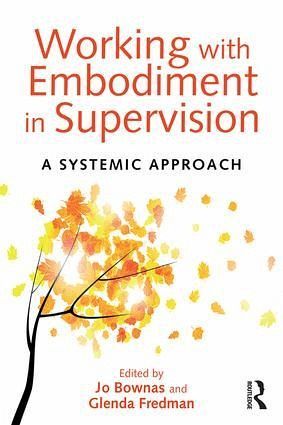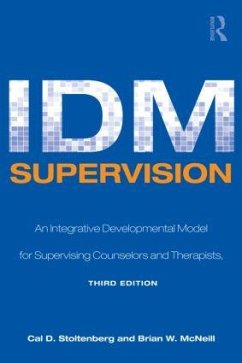
Working with Embodiment in Supervision
A systemic approach
Herausgegeben: Bownas, Jo; Fredman, Glenda
Versandkostenfrei!
Versandfertig in 6-10 Tagen
36,99 €
inkl. MwSt.

PAYBACK Punkte
18 °P sammeln!
Working with Embodiment in Supervision: A Systemic Approach offers a number of approaches to working with the body in therapy and counselling supervision. The authors are all experienced supervisors of clinical practice.The book is divided into two parts. Part One addresses how power and difference are embodied, exploring implications for the supervisory process. Part Two offers supervisees and supervisors practices for using our bodies with intention in supervision, working with physical sensation, emotion and bodily movement and expression. The book introduces a repertoire of innovative prac...
Working with Embodiment in Supervision: A Systemic Approach offers a number of approaches to working with the body in therapy and counselling supervision. The authors are all experienced supervisors of clinical practice.
The book is divided into two parts. Part One addresses how power and difference are embodied, exploring implications for the supervisory process. Part Two offers supervisees and supervisors practices for using our bodies with intention in supervision, working with physical sensation, emotion and bodily movement and expression. The book introduces a repertoire of innovative practices for supervisors to reflect on, talk about and work with embodiment in supervisory practice and includes exercises and detailed guides to assist readers in using the practices in their own work.
Working with Embodiment in Supervision will be of use for practitioners (both supervisors and supervisees) involved in supervision of clinical practice, as well as trainers and trainees engaged in supervision training. It should also be of interest to those who want to address embodiment in mental health, psychology, psychotherapy and counselling practice.
The book is divided into two parts. Part One addresses how power and difference are embodied, exploring implications for the supervisory process. Part Two offers supervisees and supervisors practices for using our bodies with intention in supervision, working with physical sensation, emotion and bodily movement and expression. The book introduces a repertoire of innovative practices for supervisors to reflect on, talk about and work with embodiment in supervisory practice and includes exercises and detailed guides to assist readers in using the practices in their own work.
Working with Embodiment in Supervision will be of use for practitioners (both supervisors and supervisees) involved in supervision of clinical practice, as well as trainers and trainees engaged in supervision training. It should also be of interest to those who want to address embodiment in mental health, psychology, psychotherapy and counselling practice.














